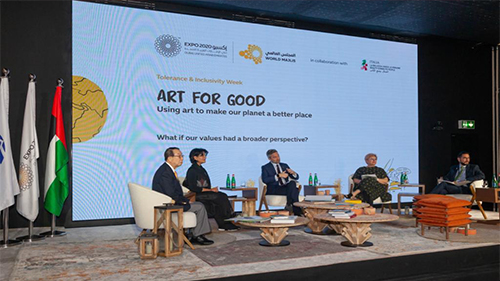Contact Center
.
17 November 2021
H.E Director General of Culture and Arts Participates in the World Majlis “Art for Good” Panel Session at Dubai Expo 2020


H.E Shaikha Hala bint Mohammed Al Khalifa, Director General of Culture and Arts at the Bahrain Authority for Culture and Antiquities, has participated as a speaker at the World Majlis “Art For Good” session at Expo 2020 Dubai, held in collaboration with Italy Pavilion, on 14 November 2021. Art for Good: Using Art to make our Planet a Better Place shed light on art and how it create a smarter and more holistic society? To address the most pressing challenges our world faces today – from climate change, to world hunger and poverty – what is needed is global understanding, empathy and action. In this context how can we better engage art as a powerful ally in promoting tolerance, understanding and meaningful dialogue – and move us towards action for a better future? This World Majlis session seeks to answer these questions through a lively conversation that brings together diverse thought leaders, visionaries and changemakers.
In addition to H.E Shaikha Hala, the panel session speakers featured Patrick Maxime Michel - Senior lecturer and researcher, University of Lausanne, IASA – Switzerland, Shoji Shiba - Business theorist, Professor Emeritus of University of Tsukuba, Japan, Grazia Tucci - Director of the GECO laboratory (Geomatics for Environment and Conservation of Cultural Heritage), Italy, Kirsha Kaechele - Artist and curator, Museum of Old and New Art (MONA), USA, eL Seed - Artist, Tunisia/ France. Dubai Future Foundation, Mr. Noah Raford, moderated the session.
During her speech in the session, Her Excellency Shaikha Hala bint Mohammed Al Khalifa stressed the role that technology plays in preserving cultural memory, but at the same time, pointing to the importance of cultural work in all its methods and means, which constitute the infrastructure for preserving the civilizational identity of nations. H.E shed lights on a number of cultural projects in Bahrain that have boosted and developed the art scene, enhancing, thus, the cultural identity and national memory, such as the mural paintings masterminded by that the prominent artist, El Seed, decorating the walls of a number of buildings in the city of Muharraq, which is today a landmark and a source of pride for the local community. Indeed, many young pioneers and artists from Bahrain participated in its manufacture. It also shed light on the importance of UNESCO's World Heritage sites, which elevate the local community and preserve many of the stories and tales of our ancestors and pass them on to future generations.
H.E went on speak about the Intangible Cultural Heritage of the Kingdom of Bahrain, its role in promoting national cultural identity, and many other initiatives launched by Bahrain Culture Authority, such as “Made in Bahrain”. Indeed, the initiative aims to reframe and reconstruct the visual and functional identity of handicraft products and traditional industries as a form of cultural expression, so that it becomes an extension of civilizational expression reflecting the Kingdom of Bahrain’s cultural identity. H.E also mentioned ‘Unearthing BH’ project exhibition, displaying “100 vases’ in a new and contemporary concept of Bahraini pottery through the public's participation, which was merged by the initiative team with metal accents such as brass, copper and steel. The Bahrain Authority for Culture and Antiquities aims to support the pottery industry in the Kingdom of Bahrain through this project







